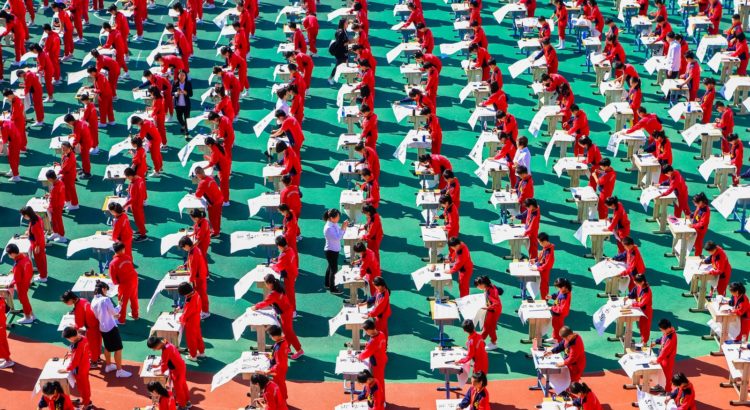Asia/Singapore/ozy.com/Andrew Jack
Resumen:La tutoría privada es una respuesta que refleja la determinación de los padres de invertir en la educación de sus hijos. También es un factor que contribuye al buen desempeño, medido por exámenes competitivos. Sin embargo, también puede causar estrés en lugar de ayudar a fomentar un enfoque más creativo para estudiar. Desde pósters que publican servicios de revisión en línea en el metro de Shanghaihasta centros comerciales que ofrecen clases después de la escuela en Singapur, la tutoría privada es un gran negocio.
“Tutoring is highly competitive,” Lim says. “This is the mental mindset of Asia.”
Singapore, Korea and Shanghai consistently produce some of the top scores as measured by international assessments such as PISA, which tests 15-year-olds in math, science and reading. Many other nations are eager to understand how these results were achieved. Teachers are typically not better paid than their counterparts in other parts of the world, class sizes are often larger and the overall proportion of government spending on education is not larger than elsewhere. Indeed, in Singapore, government spending on education is relatively modest compared with that of other high-income countries and some developing nations.
Some observers believe Asia’s strong performance begins with deep cultural respect for teachers and the value of education. “Singapore was just a piece of rock, and into the 1950s, everyone was an immigrant,” says Pak Tee Ng, an associate professor at the country’s National Institute of Education. “[They] took the view that if they worked very hard, their children would have a chance in life through good education. It was the only way out of poverty.”
Private tutoring is one response, which reflects parents’ determination to invest in their children’s education. It is also a contributing factor in strong performance as measured by competitive exams. Yet it can also cause stress instead of helping foster a more creative approach to study. From posters advertising online revision services in the subways of Shanghai to shopping malls offering after-school classes in Singapore, private tutoring is big business.
According to Technavio, a market research agency, the global online tutoring market alone will increase by 14 percent a year up until 2022, with still higher growth in Asia. “I’m not academically adept and needed a lot of help,” says Lim. “My teachers weren’t very good. The turning point for me came when my parents spent a lot of money on a private tutor.”
Even as their students are celebrated globally, eastern Asian countries are raising questions about their school systems — in particular, whether they are preparing the next generation for a fast-changing world. Many point to the focus on rote learning, with teachers dispensing facts to largely passive pupils who are primarily judged on performance in a final examination such as China’s Gaokao.
A. Qui, a graduate student from Inner Mongolia, recalls: “We were like machines in school, not humans. It was study, study, study. We did nothing else and were not allowed to have boyfriends and girlfriends. Everything was focused on exams.” Professor Li Jin at Peking University says: “The Gaokao kills diversity, innovation and novelty. Students strive for the exam because it determines their fate. It only tests how good you are at absorbing facts.”
The concern of a growing number of teachers, employers and policymakers alike is that schooling focuses too narrowly and intensely on restrictive final exams for graduating students. That neglects broader skills, and risks crushing creativity and innovation. Singapore’s Ministry of Education has for several years developed a “framework for 21st-century competencies” with a fresh focus on project work, art and culture.
Last month the city-state unveiled its “Learn for Life” program, which it described as part of its “efforts to move away from an overemphasis on academic results.” That included reducing the number of exams and no longer publishing public lists showing the precise position of individual students based on results.
In China, professor Zhang Minxuan, former president of Shanghai’s Normal University and deputy director of the city’s education commission, has encouraged the city’s secondary schoolteachers to go on study tours abroad and experiment with practices they have observed, including more group work among students. “No matter where the knowledge comes from, if it’s new we’ll consider it,” says Zhang.
Yet many educators argue that deep conservatism among parents, politicians and university admissions officers means that changes will come only slowly. “We focused on science and maths first. Now we are diversifying,” says Ng. “We need a celebration of different kinds of success, but it takes time to shift the culture.”







 Users Today : 130
Users Today : 130 Total Users : 35459725
Total Users : 35459725 Views Today : 218
Views Today : 218 Total views : 3418190
Total views : 3418190